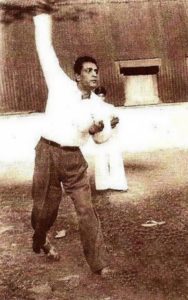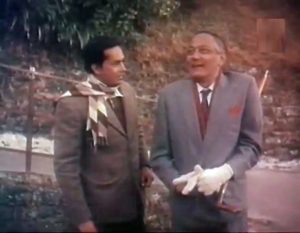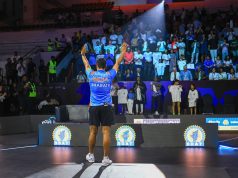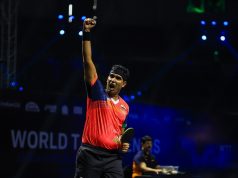Oscar-winning film maker, Satyajit Ray, had a strong Cricket connection that led him to refer some unique incidents of the game in his films and books. Perhaps he inherited this cricket love from Sarada Ranjan Ray, brother of his grandfather Upendrakishor, who was a pioneer of Cricket in Bengal.
“Went there in 1958 to play a Cricket match”, Feluda enthusiastically said when he got a chance to visit Lucknow in Ray’s Badshahi Aaangti [Emperor’s Ring]. The readers gradually come to know that Feluda used to bowl slow spin in his college and university days and had traveled to various parts representing the University team.
 Satyajit Ray himself represented Calcutta University as a slow spinner and he passed these attributes to his iconic detective character Feluda. Later in Badshahi Aangti, he narrated that Feluda searched for Neville Cardus’s Centuries in a bookstore to make an acquaintance with Mahavir, a key character in the story. Although researches show that there have been no book written by Cardus with that name, Ray perhaps made up the name for the sake of his story.
Satyajit Ray himself represented Calcutta University as a slow spinner and he passed these attributes to his iconic detective character Feluda. Later in Badshahi Aangti, he narrated that Feluda searched for Neville Cardus’s Centuries in a bookstore to make an acquaintance with Mahavir, a key character in the story. Although researches show that there have been no book written by Cardus with that name, Ray perhaps made up the name for the sake of his story.
However, Mahavir and Feluda got acquainted through Cricket and continued their conversation with a little debate about who is greater – Ranji or Bradman?
But the story that really proves Ray as a follower of Cricket is Khelowar Tarinikhuro [Tarini Uncle-The Player]. The series of tales on Tarinikhuro narrates several adventures told by Tarini Uncle himself to a group of young boys.
In Khelowar Tarinikhuro, the story starts at a time when Tarini was an employee of Virendrapratap Singh, the king of Martandapur in Madhya Pradesh. There was a long-running rivalry between Martandapur Cricket Club referred to as ‘MCC’ and Planters Club. The Planters were always ahead because of the presence of some county cricketers in the team and they defeated Martandapur in the annual game show continuously for ten years.
While working for the kingly state, Tarini came across a diary of Rajendrapratap, an ancestor of Virendrapratap, who went to London to watch Ranji play a Cricket match. Rajendrapratap mentions in his diary that he reached London in 1901 and “at last I can watch Ranji play”. He also wrote in his diary about Duleep Singh, the Nawab of Pataudi, MCC, the Maharaja of Patiala and many other cricketing moments.
All these references in the text establish that Satyajit Ray was a Cricket enthusiast who put many of his known facts about the game in the story. But the highest point of reference was that of Rajendrapratap’s diary entry- “Today, Ranji gifted me one of his bats as a token of our friendship. This is the bat with which he had scored 202 for Sussex against Middlesex. Is there anyone as fortunate as me in the world?” The innings was actually played by Ranji in July 1900 at Hove. He scored 202 in three hours with 35 fours and 3 sixes.
This bat became instrumental at the climax of the story when Virendrapratap handed it over to Tarini to play for Martandapur in the annual game show. The bat was made by the British company Gun and Moore. Tarini walked out to bat at 92 for 5 and went on to play an out-of-this-world innings of 243 to bring in victory for Martandapur against Planters.
The story concludes with Tarini Uncles’s quote, “Etodin Ranji-r sudhu naam-i sunechilum. Aaj taar mrityur sholo bochor pore nijer khela theke aach korlum tini lemon khelten.” [Today, 16 years after Ranji’s death, I could make out what he was like as a batsman through my own game.] The lines confirm the fact that Ray held Ranji in high esteem.
There are several references to Cricket in some of Satyajit Ray movies. In the famous memory-game scene in Aranyer Din Ratri [Days and Nights In Forest], the character establishes their character through the names they mention. When her turn comes, Aparna (played by Sharmila Tagore) cites Bradman.
 However, in Kanchenjungha, there is an elaborate stating of Cricket when the patriarch Indranath Roy (portrayed by the legendary Chobi Biswas) describes to Ashok (played by Arun Mukherjee) about his innings of 96 runs for Ballygunge. At 96, he was challenged by a British leg-spinner called Griggs who said, “I will now bowl you an easy one. Let’s see you send it to the ropes.” But he eventually gave a straight ball that took away Roy’s stumps.
However, in Kanchenjungha, there is an elaborate stating of Cricket when the patriarch Indranath Roy (portrayed by the legendary Chobi Biswas) describes to Ashok (played by Arun Mukherjee) about his innings of 96 runs for Ballygunge. At 96, he was challenged by a British leg-spinner called Griggs who said, “I will now bowl you an easy one. Let’s see you send it to the ropes.” But he eventually gave a straight ball that took away Roy’s stumps.
As Indranath says, “I never liked football, it hurts my aesthetic sense. But look at cricket: it has polish, it has elegance”, it very well replicates Ray’s opinion. Satyajit was never an avid soccer watcher. But he respected Pele and therefore kept all information regarding him and his World Cup exploits.
In his children magazine, Sandesh, Ray once drew a sketch of Pele and in his last film Agantuk, when the lead actor Utpal Dutta mentions Brazil, seeing actor Robi Ghosh’s interest in it, Dipankar Dey- another actor- sarcastically comments, “He is dreaming of Pele”.
In Manik and I: My Life With Satyajit Ray, Bijoya Ray once mentioned that ‘The Wimbledon Championship was on at the time. Whenever we were in the hotel, we would watch matches on T.V. Tennis was our favourite sport.”
But Ray was basically a Cricket fanatic which he perhaps inherited from his ancestors. Sarada Ranjan Ray, brother of Ray’s grandfather Upendrakishor Roy Chowdhury, was a pioneer in spreading the game of Cricket in parts of Bengal. It is noted that Sarada Ranjan walked along with a bat and book in his hands.
He played the game with passion and read about it with zeal. While studying at Dhaka College, he and his brothers – Upendrakishore, Muktidaranjan, Kuladaranjan and Pramadaranjan – established the Dhaka College Cricket Club. The Club travelled to Kolkata to play against Presidency College in 1884. In the match that was played at Eden Gardens, the Dhaka Club defeated Presidency.
After moving to Kolkata, Sarada Ranjan joined Metropolitan Institute as a teacher. But when the institute faced financial crisis, he opened ‘S Ray and Company’ which sold books and cricket kits. He also opened a shop in 1895 that sold imported cricket merchandise at a cheaper rate in Kolkata.
Sarada Ranjan Ray’s coaching skills took him to Natore where the Maharaja appointed him as the coach of the local team. His understanding of the rules of the game was so clear that he compiled the first book in Bengali about the laws of the sport.
Thus the Cricket connection of Satyajit Ray had started quite early from the days of Sarada Ranjan. His father Sukumar Ray also mentioned about Cricket in some of his verses. The most popular is Bombagorer Raja where the aunt of a king plays cricket with a pumpkin.




